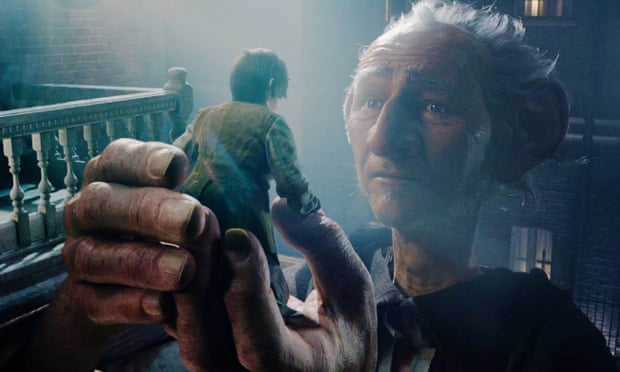Steven Spielberg’s adaptation of the classic Roald Dahl
novel “The BFG” suggests a director and source material paring that should
yield exciting work. Spielberg is the master of creating four-quadrant
Hollywood product that rides the line between the joy and wonder of cinema with
an undercurrent of menace and Hitchcockian thrills. Dahl’s books capture a
similar sense of childhood wish fulfillment often shadowed by morose details
and black humor. Unfortunately, somewhere in the production of “The BFG” the
sneakier tones and shades that made the original story pop were glossed over
with a slick, motion-capture focused accessibility that’s flattens its most
interesting quirks.
When the movie's protagonist Sophie, played by newcomer Ruby Barnhill, stares out of the window of her orphanage bedroom and we first see
the shadow of the 60-foot Big Friendly Giant, we get a glimpse of the
Spielbergian power of mystery and imagination. After the clearly animated giant
then snatches our protagonist through the window and brings her back to his
magical home in giant land the sense of mystery is quickly replaced with focus
on the special effects and Dahl’s idiosyncratic dialogue. We are also
introduced to a pack of bigger, meaner, man-eating giants who live with the BFG
and who pose a threat to Sophie, so long as she’s living with her capture, but
that threat is never treated with enough weight or seriousness to effectively
motivate the narrative.
The film tries to balance the unfamiliarity and strangeness
of Sophie’s new surroundings, and like Dahl’s other novel “Charlie and the
Chocolate Factory” we are lead through a series of set pieces were we are
introduced to a lot of silly and bizarre concepts, but the hallmark-channel
tone of the film never allows for the necessary emotional peaks or valleys to
ground these concepts in a way that properly thrusts the story. Even John
Williams’s lilting score is always humming inoffensively in the background and
never recedes or swells to punctuate scenes in a meaningful way.
The choice to iron over Dahl’s threatening world with the
story’s friendlier message leaves the audience with little else to attach
ourselves. The photo-realistic animation is the focus of the movie and it isn’t
new enough or distinct enough to wow us into loving the characters. Mark
Rylance’s voice work as the friendly giant is commendable and Barnhill’s
interactions with a green-screen environment is seamless and mostly convincing
but the film suffers from an amiable blandness that surprisingly lacks creative
vision.
As a children’s film “The BFG” is not a grating or
unbearable experience but it’s also not a memorable one either and from
Spielberg this come with a harsher critical eye, given that he essentially
perfected this genre with his past films such as “E.T: The Extra Terrestrial.” Hell,
even the often maligned “Hook” took more risks and wasn’t afraid to build in
moments of suspense and peril to underline the dramatic stakes. “The BFG” has a
few transcendent moments in which it’s director seemed to be engaged with the
material, but the overall execution of the film is a missed opportunity.
Grade: C
Originally published in the Idaho State Journal - July/2016
Listen to this week's episode of Jabber and the Drone to hear more conversation about "The BFG."

